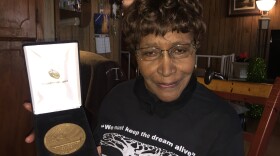Alabama Public Radio is diving into our archives as APR observes forty years on the air. The U.S. State Department recently invited APR to address a delegation from Africa on our fourteen month investigation into human trafficking. The group was part of what's called the International Visitor Leadership Program. Part of APR's talk was on an experimental database that law officers and victims’ advocates could use at the same time. Following the address, one delegation member wrote...
"...I remain convinced that your (Alabama Public Radio's) commitment and determination to shed light on human trafficking through your investigations is one of the solutions that can help eradicate this problem."
Here’s that story from the APR archives.

Editor's note-- the following article contains material of an adult nature. Parents may want to consider whether it's appropriate for all ages.
“She was one of the most traumatized young females I think I’ve ever interviewed,” recalls Tuscaloosa Police Lieutenant Darren Beams. He runs the West Alabama Human Trafficking Task Force. Beams used to work homicide. He recalls the one case that convinced him trafficking was worse.
“She’d been in the trafficking world since she was twelve, she had been forcibly raped since she was twelve, she had a baby when she was sixteen," says Beams. "The baby was placed in the microwave oven by a trafficker. He threatened to turn it on. So, he kept her in that life.”

Tonight, Beams and the Task Force ar going hunting with an undercover sting operation at a Tuscaloosa County motel. The group of law officers representing four departments is about to net its first suspect of the night. One of the female officers is alone in a guest room as a potential John arrives to talk price. Four more members of the task force are standing outside the back door to the room. First bust The handcuffs go on and the first suspect is ushered out for booking. One observer for tonight’s sting is Christian Lim. You heard from him earlier in our series. Lim is leading a human trafficking project at the University of Alabama’s College of Social Work. He says he has something in mind that could be a new tool to aid both victims of trafficking and the people who try to help them.
“The best practice, and what I’ve seen actually work, is when they’re sitting down at the table, along with law enforcement, along with mental health, along with probation and other people, working together to find a solution for this victim," says Lim.

Lim and his team are designing what’s called the first ever internet database meant to be used by everyone involved with trafficking victims. That includes law enforcement, social service groups, and even the victims themselves. But Lim admits, the database is the easy part. It’s changing mindsets that gets tricky.
“Yeah, it’s a huge shift, and not just for law enforcement, it’s a big shift for all the partners involved," asserts Lim.
Here’s what Lim means by a big shift.
“The shift is understanding that your role is important and is essential, but so is the role of the person I had previously been viewing as my adversary—that their role is essential and important, and both in justice, but in recovery and restoration," says Lim.
Lim spent fourteen years with the Los Angeles County Sheriff’s Department. For law offficers like him, the shift means getting officers past the stereotype that they arrest the bad guys and social workers give them a hug.
“It was hard,” says Tuscaloosa police Lieutenant Darren Beams. “When we started training in the department, we had a lot of officers that resisted, transitioning from a criminal to a victim approach.”

A victim approach means establishing whether a sex worker was forced by a trafficker. If an underage minor is involved in the sex trade, they’re automatically considered a victim of trafficking. Adults have to be coerced or lured in by fraud or deception. Lieutenant Beams says there’s a catch.
“A lot of them that are involved in commercial sex know the language we’re looking for. In other words, people in handcuffs tend to lie… They know the clues that we’re looking. But, we still a have few…little things in our bag…little tools in our bag that we identify those who are not telling the truth," he says.
Back at the sting operation in Tuscaloosa, the arrests are trickling in. Without naming names, the list includes college aged young people, one member of the military, and a trucker who left his eighteen wheeler idling in the parking lot while he allegedly dropped in to buy sex. For Christian Lim, the next step is rolling out the University of Alabama’s shared trafficking database. He says the goal is to make sure trafficking victims don’t get lost in the cracks...
“And so, you have a system that’s working now to truly find justice, and help this person toward restoration, as opposed to in the case of a defense attorney and prosecuting attorney, a couple of professionals working to win a case," says Lim.
And Lieutenant Beams and the West Alabama Human Trafficking Task Force will play a part in that. His team is being asked to help train state law officers in how the task force operates. Beams says that includes his own officers who once opposed treating sex workers as possible victims of trafficking.
“It was hard, and it was difficult to change the mindset," says Beams. "And across the state I think it’s still difficult, cause we’re one of the only task forces running right not that address it like we do.”
And perhaps changing more mindsets one at a time.
Editor's note: If you or someone you know is being trafficked, Alabama Public Radio has a list of resources to help. Go to apr.org-slash-traffic for phone numbers and links to groups that support trafficking survivors. You can also text the word traffic to 855-353-6644.





























